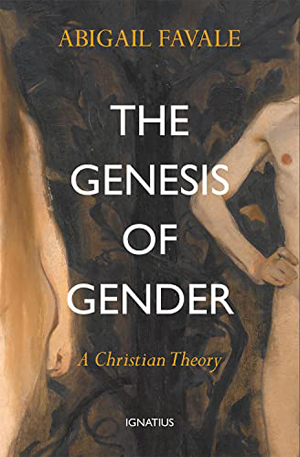‘Genesis of Gender’ helps to put perspective on complex current topics

Reviewed by Nancy Piccione
I’ve written before — more than once — about how I, like many people, prefer to avoid tough topics. Can’t we talk about things that are more cheerful than abortion, or pornography, or toxic cultural trends?
And yet, the issues do not go away if we ignore them. The human cost can be very real. Finding reliable, knowledgeable sources is more demanding than ever.
Being an informed Catholic and disciple of Christ is having an openness to learning, as well as a sense of curiosity towards the world and current issues.
That’s why I am so grateful for a book like “The Genesis of Gender: A Christian Theory” by Abigail Favale, to help put some complex current topics in perspective.
“The Genesis of Gender” is part memoir, part feminist history and theory, and part spiritual reflection on how we might move forward as a culture.
Favale, an English professor with a deep background in women’s and gender studies, is well-equipped to lead readers through the issues. And as an unlikely Catholic convert, she shows how Catholic theology and worldview is solidly equipped to navigate our complicated times.
FREEDOM, GENDER IDENTITY
The book opens with Favale’s own intellectual and spiritual journey, then zooms out to chronicle the history of feminism, our current cultural moment, and more.
The book’s chapters have one-word titles: for example “Waves,” “Control,” and “Artifice.” The chapter titled “Waves,” for example, outlines feminist history from the 19th century until today. “Cosmos” explains how the Christian creation accounts differ from more violent and less “good” creation myths, and why that is important for our understanding of the human person and our gender identity.
Favale excels in explaining how a modern concept of “freedom” actually involves denial of the reality of the human person, especially women. She writes:
“Too often, freedom for women is cast as freedom from femaleness. Autonomy is envisioned according to male parameters, and women are expected to use invasive chemical and surgical means to conform their bodies to that ideal. Women are not valued simply for being; they must prove their value by doing.”
SENSITIVE, MEASURED APPROACH
The chapter titled “Wholeness” is worth the price of the book. Favale shares her story of body dysphoria after giving birth, and the postpartum depression that resulted from it. This is a common experience, and she shows how this sense of “not belonging” in one’s body is near universal at different stages of life. The answer to that discomfort and even pain is not the change of the person, but a radical anthropology of acceptance about how God made us: good. Very good.
It’s demanding — at best — to write about issues that are both complicated and controversial. I admire how Favale writes to inform and enlighten in a way that’s not overwrought, but sensitive and measured.
Not all books are meant for all people, but I heartily recommend reading “The Genesis of Gender” to anyone — especially women — interested in learning more about gender issues from a feminist and/or Christian perspective with an open mind and a sense of curiosity.
 NANCY PICCIONE edited The Catholic Post’s Book Page for eight years and is now part of its book review team. A member of St. Jude Parish in Peoria, she blogs at ReadingCatholic.com.
NANCY PICCIONE edited The Catholic Post’s Book Page for eight years and is now part of its book review team. A member of St. Jude Parish in Peoria, she blogs at ReadingCatholic.com.





